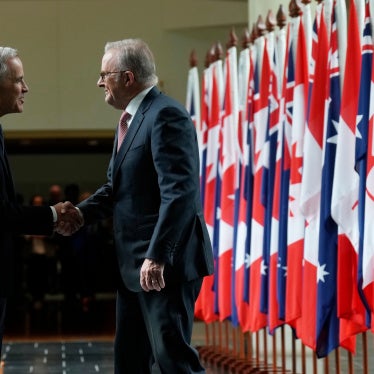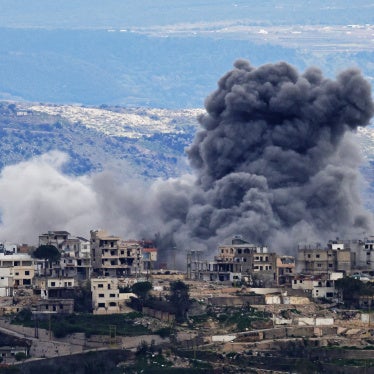(Washington, D.C.) – A Mexican Supreme Court ruling on November 6, 2013, affirms the Mexican constitutional principle that evidence obtained through torture or other violations of fundamental human rights is inadmissible, Human Rights Watch said today.
The court ordered the immediate release of Israel Arzate Meléndez. He was arbitrarily detained by the military in 2010, tortured to confess to taking part in a multiple homicide, and held for more than three years in preventive detention while he awaited trial. The Supreme Court has yet to publish the grounds for reaching this decision, and so its scope remains uncertain.
“The Supreme Court’s ruling is a long-overdue acknowledgment by the government that Israel Arzate’s confession was obtained in violation of his rights and should never have been allowed as evidence,” said José Miguel Vivanco, Americas director at Human Rights Watch. “Beyond freeing Israel, the court should use the ruling to affirm a clear and unequivocal prohibition on the use of torture-tainted evidence in Mexico’s justice system.”
Arzate’s case was one of more than 170 cases of torture Human Rights Watch analyzed in its November 2011 report, "Neither Rights Nor Security," which documented the widespread and systematic use of torture by Mexican security forces involved in counternarcotics efforts in five states. In August 2013, Human Rights Watch submitted an amicus curiae brief in the case to the Supreme Court.
Arzate was arbitrarily detained by army personnel and men in civilian clothing on February 3, 2010, as he walked down the street in Ciudad Juárez and taken to a military base. There, he was held incommunicado and tortured until he confessed, following a script provided by his interrogators, to participating in the horrific killing of a group of students in Juárez’s Villas de Salvárcar neighborhood on January 31, 2010. The torture included waterboarding, electric shocks, and asphyxiation.
Arzate was presented as a suspect to reporters, then transferred to a prison, but was subsequently removed by investigative police and returned to the military base, where he was again tortured
At his arraignment, Arzate told the presiding judge that his confession had been elicited through torture, and that he had been taken out of prison and tortured at a military base. The judge ordered his trial nonetheless. A judge ordered Arzate held for six months in preventive detention while the investigation was conducted, and the detention was later extended by an additional six months. Under law in Chihuahua, a maximum of one year of preventive detention is allowed.
When the second period of six months had expired, another judge ordered Arzate’s detention under a process called arraigo, contending that he presented an “increased risk to society.” Arraigoallows prosecutors, with judicial authorization, to hold organized crime suspects for extended periods before they are charged with a crime. Arzate was transferred to a police detention facility, and held until September 26, 2012, when he was moved to house arrest after a court found that his detention in the police facility was illegal.
Mexico’s National Human Rights Commission investigated Arzate’s case and found that the military had held him incommunicado and tortured him before transferring him to prosecutors. The commission carried out a medical exam which found that Arzate’s physical and psychological condition was consistent with the torture he described, as stated in its August 2011 recommendation on the case.
The Supreme Court’s First Chamber took on the case in October 2012.
The Human Rights Watch amicus brief set out the legal arguments for freeing Arzate on the grounds that any evidence obtained through torture should be barred under international human rights standards, including those enshrined in treaties ratified by Mexico. Human Rights Watch stated in the brief that: “We consider it of the greatest importance that the Supreme Court reaffirm that a confession obtained under torture is inadmissible as evidence in criminal proceedings against the victim.”
Mexico’s Federal Law for the Prevention and Punishment of Torture, passed in 1991, makes it a federal crime to practice torture and establishes that no confession or information obtained through the use of torture can be used as evidence at trial. In June 2008, Mexico passed a constitutional reform affirming that any evidence obtained through torture or other violations of fundamental rights is inadmissible.
Human Rights Watch argued that the Supreme Court’s ruling was particularly important because the case took place in Chihuahua – the first Mexican state to make the transition to the new oral, accusatory justice system meant to provide greater protection for fundamental rights. “One of the guiding principles and motives for the transition to the new system is precisely the need to protect fundamental rights and guarantee that, rather than accusing people based on evidence extracted through coercion, which is often false, the system of law enforcement and justice is based on evidence that is reliable and legitimate,” Human Rights Watch wrote to the Supreme Court.
“Now that the Supreme Court has freed Arzate, the authorities should fully investigate his allegations of torture and hold those responsible to account,” Vivanco said.






